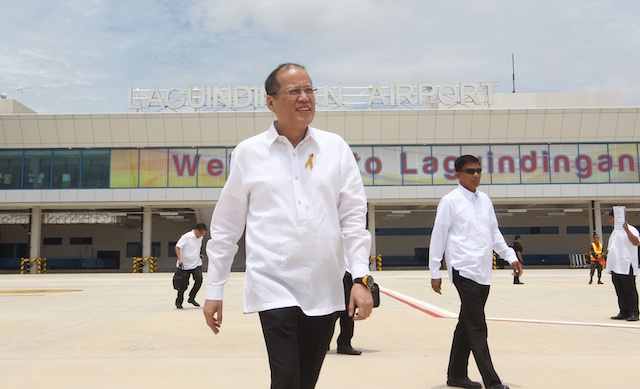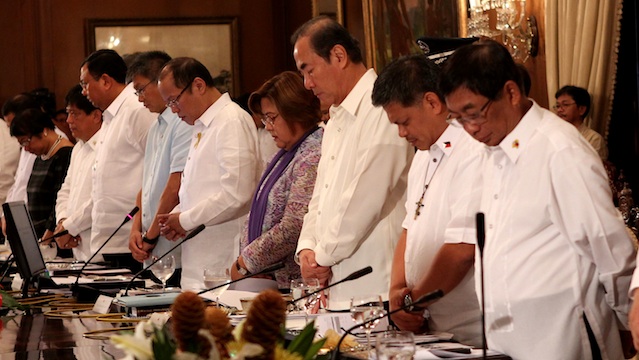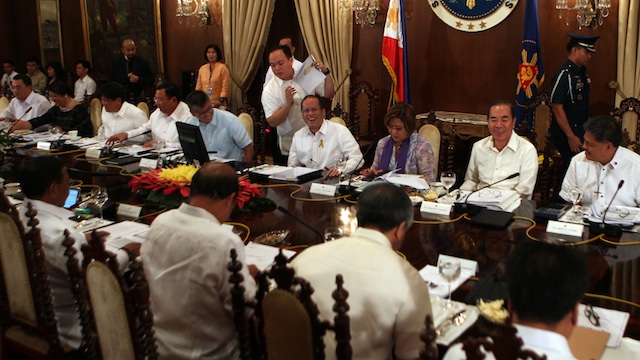SUMMARY
This is AI generated summarization, which may have errors. For context, always refer to the full article.

MANILA, Philippines – When President Benigno Aquino III gathered his Cabinet secretaries to discuss the 2014 budget on Monday, July 8, the meeting took all of 10 hours. But he still wasn’t satisfied.
Aquino wanted details. He wanted answers. And he wanted numbers.
So he called them back on Wednesday, July 10, two days later. That meeting also took all day.
His mood depended largely on who was proposing the budget. If the Cabinet Secretary had the information, was able to answer Aquino’s questions, and had data to support claims, the President was a happy man.
But more than once, he stepped out of the room, frustrated when questions went unanswered, when data were insufficient, and when secretaries were inadequately prepared.
“Tell me, am I not understanding this, or is there something wrong with the presentation?” he’d ask the room before walking out to take a breather.
He’d come back when his head was cooler before continuing with the meeting.
The 2014 budget was finally approved at 10:30 pm, Wednesday, after Aquino dissected every centavo of the P2.268-trillion budget.
Nitty-gritty
The President of the Philippines is a man obsessed with evidence and facts. He is hands on, accurate, and straight to the point. He has little patience for frills, a man blessed — or cursed — with a semi-photographic, unusually keen memory.
He is a voracious, insatiable reader, who retains a huge chunk, if not all, of what he reads. He devours stacks and stacks of documents, including all of the 300-page Atimonan report. He remembers conversations and statistics mentioned to him, even when the original source of the data forgets.
Cabinet secretaries, when presenting to Aquino, have likened the experience to “oral examinations,” or a “thesis defense.” And when Aquino is dissatisfied, he’ll interrupt: “Stop it,” he would say. “That’s enough.”
“You cannot fool him,” Budget Secretary Butch Abad said. “You’d rather ask for a postponement than suffer the humiliation… you cannot fudge, you cannot lie.”
It’s a style, Abad said, that has pushed the Cabinet further, and has forced them to know the most minute detail about every project, every proposal of their department. They have to be a step, if not several steps, ahead of the boss.
Transformed
In 2010, Filipinos decisively elected Aquino, who never planned to be President. He was an unassuming bachelor-politician, sustained only by his bloodline of democracy icons.
“Here was somebody who was reluctant but who accepted the challenge with apprehension and uncertainty,” said Abad.
But the past 3 years have done much for someone thrust into a situation not of his choice.
The achievements of Aquino’s administration in the first half of his term — impeaching a Chief Justice, passing controversial legislation such as the Reproductive Health bill and the sin tax bill, and achieving stellar economic growth — have helped boost his confidence.
Unprecedented and consistently high approval ratings, along with accolades from the international community, have helped tremendously too.
The result? 3 years into his term, “he isn’t the same PNoy as before,” Abad said.
“It was a dramatic change… Before, he was relaxed, content with just the overview,” said a Cabinet official who agreed to speak on condition of anonymity. “Now he beats all his Cabinet secretaries. He knows the details of what is being discussed.”
Secretary to the Cabinet Rene Almendras agreed.
“He’s become a lot sharper as far as running the Cabinet and the country. Time grants you experience, experience translates to wisdom. He has a lot more confidence, a lot more decisiveness, a lot more clarity, and sharpness,” he said.
“It’s the experience of the past 3 years that has really built a better president.” And because he is better, he also demands more from those around him.
Expectations
Aquino expects the Cabinet to challenge themselves, often telling them, “Why don’t you try to resolve this among yourselves? If there’s no consensus, then bring it up to me and I can make a decision,” Almendras quoted him as saying.
Abad added, “He always says, ‘You don’t come to me with a problem, you come to me with a problem and you tell me what can we do. Lay me options, tell me based on your study of the matter, I think this is the best option to take. That way you’re helping me and you’re not adding to my burden.'”
The experience has paved the way for a definitive management style, which Abad said has “evolved.” Aquino had always been detail-oriented, but has become “increasingly so,” said Abad. He likes seeking advice of experts.
“He’s always been a consensus and consultative manager,” said Almendras. “Whenever there is a decision that needs to be made, [he seeks] perspective that is relevant to the issue. That’s why he likes the cluster system.”
It’s a description that is consistently reiterated by those who work with Aquino: he likes discussions, hearing various sides, and listening to disagreements. When making decisions, there is always an opportunity to reach a consensus. But in the end, he will make the final call.
After all, Almendras said, “he is the one who will be held responsible.”
Stubborn
This is probably why while consultations are vital to Aquino, once the President makes up his mind, it is often final.
“If he wants to do [something] he will do it,” said the source. They cited Aquino’s decision to boycott the Nobel Peace Prize in 2010 despite the disapproval of analysts, and the high-risk but ultimately successful attempt to impeach then Chief Justice Renato Corona.
This stubbornness, the source said, makes it hard to reach out to Aquino when a decision has been made.
“We rarely disagree with him,” he said. “He is his mother’s son. [Former President] Cory [Aquino] didn’t like unsolicited advice. It either has to be a full court press where all of us tell him, or not.”
Abad agreed that offering a different perspective is a delicate balancing act: “It depends on how you say it, when you say it,” he said.
“We’re learning this, with some pain. You know him better as a person, [so] you know when it is the most opportune time to tell him about another position to a perspective.” But he maintained that, “when the President is very strong on something, you just have to respect that.”
Like a child, Aquino needs coaxing at times, the source said, especially when trying to convince him about an opposing view. He doesn’t like hearing bad news past 6 pm, because it keeps him up at night worrying about it.
He goes by the saying, “If it’s not broken, why fix it?” because changing something, he believes, “is an acceptance there is something wrong.”

Admitting mistakes
The President does not like admitting he is wrong.
“Don’t tell him he’s wrong,” warned the source. “He’s not very good with criticism.” Instead, he only admits to his faults “in his own time.”
The source also said Aquino is not much of “a political operator” and has a tendency to follow his instincts, sometimes failing to anticipate consequences.
He pointed to the Sabah conflict which “could have been handled more diplomatically” as a prime example — and Aquino’s failure to consider the possibility it would sabotage peace talks.
He also cited the Taiwan row, saying Aquino “trusted the Coast Guard” since the very beginning.
“He’s an ordinary guy with ordinary needs…He doesn’t have the sophistication of his father who could calibrate. His leadership is more instinctual in nature,” the source said.
Political immaturity
This lack of political maturity is the President’s greatest weakness, said the source.
“The country needs ideological solutions and a strategy. He was never trained to be ideological. It’s good he has started reforms but if you want that consummated you need a vision,” he said.
“He has things he thinks are vision. But anti-corruption is not a vision. [How we’re dealing with] China is not a vision, they are tactics.”
Aquino, the source said, has never mentioned what he wants for the Philippines in 20 years, or 50 years — something the likes of China and Malaysia have.
“Leaders and presidents are imperfect beings,” the source said. “You have to deal with that or leave.”
In Aquino’s administration, very few have opted for the latter.
Doing more
Aquino wakes up early and sleeps little. He is tireless.
After the budget was approved, he asked some Cabinet members to stick around and talk about the wealth-sharing annex of the Bangsamoro. He invited them for dinner, and they stayed together, talking, until 2 am the next morning.
Once every quarter, he unwinds with his Cabinet. There is usually a band, some singing and some dancing. He likes to chat with friends, make jokes, share anecdotes.
But for the most part, he is completely preoccupied with running the country.
“He works really hard. I don’t think the Filipino people can say anything even remotely close to being short-changed by the effort and all the sacrifice that he has put into being President of this country. He almost absolutely invested himself in the work,” Abad said.
This is why Aquino gets most affected by critics who say he is not doing enough.
While Aquino often ignores the criticisms, “he doesn’t understand why people continue to criticize him as if he has not done anything for this country,” Abad said.
Almendras offered another explanation for why such criticisms strike deep: they hit at the very core of what Aquino stands for.
Nationalism
“His greater strength is his love for the Filipinos. At the end of the day, [he asks], ‘What is going to be good for the Filipino people?'” Almendras said. “I pray the next President will love this country as much as he loves this country.”
Almendras said it is this nationalism and genuine concern that helped Aquino stand firm against China — an instinctual, emotional decision that others may argue, override logic, given that no country in Asia has had the courage to stand up to the superpower.
While the source said Aquino’s stubbornness may be viewed as negative, his refusal to compromise or be bullied may likewise be viewed as a positive thing. In the case of China, Aquino has been praised for the position he took, even by other countries, including the United States.
The same love for country has made Aquino an impatient President, one who wants to keep doing more.
According to Almendras, Aquino’s thought process is: “If we could do that before, when we were new, now that we know more, our results should be better. Let’s do more.”
It is an attitude that has “stressed” some members of the Cabinet, but for the most part, has inspired them to follow suit.
Loyalty
There are several other things Aquino will not compromise, those who know him said. They are values that guide and define his day-to-day decisions and his presidency.
For instance, he values relationships and friendships above all. He puts a premium on loyalty — and this partly explains why there has not been a major overhaul in his Cabinet since he started. His “walang iwanan (nobody leaves anyone behind)” mentality drives him. And it calls to mind a similar appeal by former president Joseph Estrada.
Critics say he is loyal to a fault, defending his friends even in the most difficult of circumstances. For instance, former Interior Undersecretary Rico Puno, an old shooting buddy who was put under the spotlight for bidding anomalies involving the Philippine National Police, was someone Aquino stood by.
But Abad understands why: “That’s a function of his own life experience. [His family has] been under siege for the greater part of their lives. During martial law, his father was in jail, assassinated, there were 8 coup attempts against his mother, he almost lost his life, he lost 5 of his 7 bodyguards, you can see he’s always wary. He does not take things for granted, he makes sure his back is covered, and the people around him he fully trusts.”
According to the source, 4 Cabinet members continue to enjoy his trust the most: Abad, Almendras, Interior Secretary Mar Roxas, and Executive Secretary Pacquito Ochoa. They have become even closer after the sudden death of the late Interior Secretary Jesse Robredo.
Abad agreed. He said the team as a whole “became more appreciative of each one’s contributions to the Cabinet” after Robredo’s death, with Aquino himself experiencing the “deep loss,” having learned what it was like “to lose someone who is a vital person in the Cabinet.”

Integrity
Additionally, Aquino has little patience for corruption. He was obsessed with it in the first half of his term. The efforts have borne fruit — surveys show Filipinos have begun to trust government again, something Abad considers the administration’s biggest achievement.
“Not only [do people] trust the government, even public institutions are enjoying unprecedented levels of approval and trust. He is the tide that lifts all the boats,” Abad said.
“I don’t think that is possible without his leadership, because of the kind of person he has demonstrated he is… I think once you establish that fundamental condition which is people trusting you and the government, the rest follows.”
But the core value that shapes Aquino, considered by many around him as his biggest strength, is his integrity. He is honest, and he is exactly who he projects himself to be. He has a “real concept of social justice,” and a strong “sense of fairness,” said the source.
At the core of it, the President of the Philippines, they agreed unanimously, is a good person.
“I don’t see any sense of entitlement for a person of his position. If you have that, it won’t do you any good if he sees you have it,” the source said. “He has an organic humility… he’s self-deprecating. He’s an ordinary guy with no pretentions.”
And 3 years in, despite the successes, this has not changed.
“He is the same modest person. He has no ego at all,” said Abad. “It’s infectious.”
Time is running out
Aquino thinks a lot about what will happen when he leaves office in 2016. He knows he is running out of time, but it has motivated him more than intimidated him.
“He’s very conscious of the time left. Not because of his legacy but it’s really because he wants to take advantage of every single day left… It’s about ‘Let’s do this now, let’s start this now so the people will follow,'” Almendras said.
He is upbeat, said the source, having been able to set the pace in the first 3 years. “He’s catching up. It’s just that the task is so huge.”
Even Abad admitted, the achievement of the government “has gotten way beyond our expectations.”
“The problems that we encountered when we started that were unraveling before our eyes, they seemed to be insurmountable,” he said. Because of this, Aquino has tried to fix what he can to spare his successor the same burden he was confronted with when he began.
“He’s not just going to leave after 2016, he wants to make sure what he does is carried on. We have not gotten a break in a long time. He has given this country that break,” Abad said. “That’s the mark of a real leader. He will not be satisfied with ‘I’m done, so bahala na kayo diyan.’
In fact, he always says, ‘If we can solve it, why would we pass it to the next?'”
Last 3 years
Among Aquino’s priorities are: inclusive development, job generation, and making sure economic growth is felt by the poor.
And while the administration believes 3 years is enough time to achieve its remaining goals, it is also painfully aware that Aquino’s term is almost over.
“He’s seriously already thinking of legacy. Not just his legacy, [but also his family’s]. His life has been a restoration of putting People Power back on track,” Abad said. “He thinks the greater legacy is the legacy of martyrdom of his father and the legacy of sacrifice of his mother.”
The source agreed. “Personally, he cannot wait to finish his term,” he said. “But a big part of his leadership is a legacy for his parents.”
This is why Aquino is preoccupied with fixing the many things that are still broken.
At the end of the 2014 budget deliberations, Aquino asked his Cabinet members — for the first time in the country’s history — to sign a performance contract that says he will meet with each one periodically so he knows exactly how far they’ve gone in achieving their department’s goals.
Aquino wants to make sure that in the last 3 years of his term, the country moves the closest it possibly can, to where he wants it to be. – Rappler.com
Add a comment
How does this make you feel?
There are no comments yet. Add your comment to start the conversation.